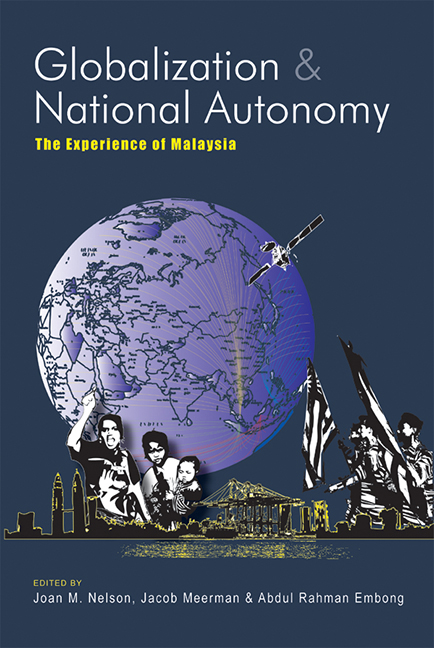Book contents
- Frontmatter
- Contents
- List of Abbreviations
- List of Tables and Figures
- Preface
- Contributors
- Chapter 1 Introduction
- Chapter 2 Developmentalist State in Malaysia: Its Origins, Nature, and Contemporary Transformation
- Chapter 3 The Look East Policy, the Asian Crisis, and State Autonomy
- Chapter 4 The Malaysian Success Story, the Public Sector, and Inter-ethnic Inequality
- Chapter 5 Poverty Eradication, Development, and Policy Space in Malaysia
- Chapter 6 Trade Liberalization and National Autonomy: Malaysia's Experience at the Multilateral and Bilateral Levels
- Chapter 7 Malaysia's Education Policies: Balancing Multiple Goals and Global Pressures
- Chapter 8 Malaysia's Healthcare Sector: Shifting Roles for Public and Private Provision
- Chapter 9 Globalization, Islamic Resurgence, and State Autonomy: The Response of the Malaysian State to ‘Islamic Globalization’
- Chapter 10 The National Culture Policy and Contestation over Malaysian Identity
- Chapter 11 Conclusions
- Index
Chapter 5 - Poverty Eradication, Development, and Policy Space in Malaysia
Published online by Cambridge University Press: 21 October 2015
- Frontmatter
- Contents
- List of Abbreviations
- List of Tables and Figures
- Preface
- Contributors
- Chapter 1 Introduction
- Chapter 2 Developmentalist State in Malaysia: Its Origins, Nature, and Contemporary Transformation
- Chapter 3 The Look East Policy, the Asian Crisis, and State Autonomy
- Chapter 4 The Malaysian Success Story, the Public Sector, and Inter-ethnic Inequality
- Chapter 5 Poverty Eradication, Development, and Policy Space in Malaysia
- Chapter 6 Trade Liberalization and National Autonomy: Malaysia's Experience at the Multilateral and Bilateral Levels
- Chapter 7 Malaysia's Education Policies: Balancing Multiple Goals and Global Pressures
- Chapter 8 Malaysia's Healthcare Sector: Shifting Roles for Public and Private Provision
- Chapter 9 Globalization, Islamic Resurgence, and State Autonomy: The Response of the Malaysian State to ‘Islamic Globalization’
- Chapter 10 The National Culture Policy and Contestation over Malaysian Identity
- Chapter 11 Conclusions
- Index
Summary
INTRODUCTION
One strand of the globalization debate focuses on the negative impact of globalization on the autonomy of a nation state, where autonomy is defined as the ability to exercise self-determination in economic affairs. For example, Yu (2005, p. 2) summarized the views of Chinese scholars, whereby many believe that “globalization brings Westernization, and above all, Americanization of China. Such a development is equated with the loss of autonomy.” Webb and Sinclair (n.d., p. 1) note that “Economic globalization is often blamed for forcing governments to cut or alter social welfare programmes, and thereby also for limiting the autonomy of the political institutions (that is, nation-states) that are primarily responsible for achieving social welfare goals.”
In Malaysia, Tun Dr Mahathir, former prime minister of Malaysia, argued that “…for most of the developing countries, globalisation means not more freedom but less freedom from rules, regulations, laws and policies. Worse still, these uniform rules, regulations, laws and policies disregard their particular weaknesses and problems” (Mahathir 2002, p. 14). Similarly, Dato’ Mustapa Mohamed, currently minister of higher education, notes that “Globalisation is encroaching into national sovereignty and eroding the role of the State in national policy making functions.” Moreover,
What we want to see is globalization with a human face. Globalization must benefit everyone. It must especially benefit the poor. There must be a level playing field for all players. Globalization must not erode the independence, sovereignty and dignity of nations and their peoples. The free flow of ideas, people, resources and capital across borders must not result in new forms of colonization or harm the poor countries.
(Mustapa Mohamed, 2002)This chapter considers how and if globalization forces have affected Malaysia's drive to eliminate poverty over the last three and a half decades. More specifically:
i. What were the trends and patterns of poverty incidence in Malaysia between 1970 and 2004? To what extent were poverty goals achieved by 2005?
ii. How have globalization forces affected Malaysia's persistent and long-term drive to eliminate poverty?
iii. What additional factors limit policy space or autonomy with regard to poverty reduction in Malaysia?
- Type
- Chapter
- Information
- Globalization and National AutonomyThe Experience of Malaysia, pp. 116 - 158Publisher: ISEAS–Yusof Ishak InstitutePrint publication year: 2008

